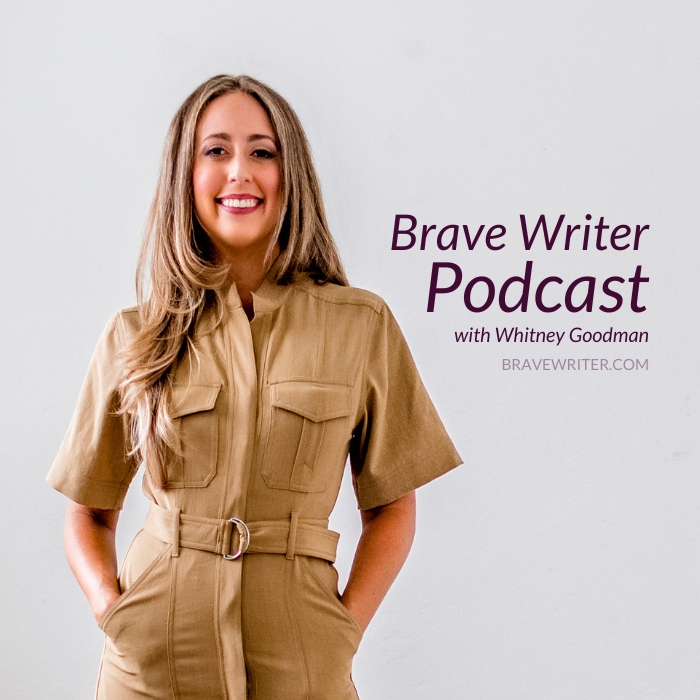Podcast: How Adult Kids Can Get Along with Their Parents with Whitney Goodman

Whitney Goodman is the author of Toxic Positivity, a book sharing its release date with my own, Raising Critical Thinkers. She’s a psychotherapist with a wonderful Instagram account, @sitwithwhit, where she offers insightful support to young adults seeking to recover from childhood pains and traumas.
She was previously on the podcast in May 2022 where she discussed her book and the downsides of positive thinking. Lately, Whitney has zeroed in on the challenge of creating healthy relationships between adult kids and their parents.
Meanwhile, I’ve been in conversations with my adult friends about how to relate to their Millennial and Gen Z kids as they set boundaries and communicate their pain. We all want connection — but most of us are unsure of how to get it.
On today’s Brave Writer podcast, Whitney and I hope to represent these two generations and discuss how to heal pain and foster connection.
We even do some role-playing!
Show Notes
Why is this such an important topic today?
In Whitney’s practice, most of her patients from the ages of 25 to 35 have been having a really hard time relating to their parents. But why is this such a big issue today, when it doesn’t seem to have been before?
This generation, more than any other, has more awareness of family systems, dysfunctional families, and things like that. The generations of kids are parents today have been raised both on different expectations and even a different vocabulary entirely. Not only does this make relating more difficult, it means that our lens for judging how well we parented or were parented is different.
Now we have parents who look back and believe they did so much better than their parents, and yet they feel like they are being judged even harsher. But most kids aren’t doing this to bully or blame their parents — they’re searching for understanding and connection, and they want to be heard.
How to reach some common ground.
When adult kids dealing with trauma are trying to reach understanding with their parents, it’s important to note that both parent and child can feel differently about the way a certain event took place and both of those things can exist at the same time. Both parties have to be open about the experience the other went through without shutting down.
It’s especially important for adult children to recognize that, while it feels like your emotional maturity will only continue to improve as you get older, that’s not always the case. You in your 20s or 30s may have more emotional maturity and literacy than your parent.
Setting boundaries that aren’t just punishment.
Yes, it’s important to set boundaries and enforce them. But what many people get wrong is that boundaries are not meant to be punishment for a perceived wrong. Boundaries are, instead, meant to be used as a method of self-care: Taking out own needs into account over the wants of others.
To set boundaries that don’t cross over into punishment, you need to apply nuance to the situation. Consider how you approach the conversation. Instead of an authoritative statement — “I’m not celebrating Christmas at your house this year” — try explaining the situation, why it’s important to you, and establish what ways you’re willing to be flexible.
What’s missing from a lot of these conversations is empathy.
Understand the perspective of the other person: Can you recognize what it’s like to be taking care of young children, being incredibly busy, and is expected to drive an hour to someone else’s house early on Christmas day?
Additionally, if your boundaries are hurtful to others and you want to show them some sympathy without completely giving up those boundaries, try finding little ways to make things better. Set time limits, openly say you won’t be cooking, or whatever compromises you can come to.
Whether you’re the parents of adult children or the adult child in that situation, there is still an illusion that “grown-ups” know more than they do. We can put too much pressure on our parents to have everything figured out, but the truth is that we’re all just figuring it out at the same time. And to do that, we need to cooperate and reach some shared understanding.
Resources
- Whitney’s website: sitwithwhit.com
- Read her book: Toxic Positivity
- Instagram: @sitwithwhit
- Podcast: Toxic Positivity & the Downside of Always Looking Up « A Brave Writer’s Life in Brief
- Sign up for our Text Message Pod Ring to get podcast updates and more!
- Want help getting started with Brave Writer? Head over to bravewriter.com/getting-started
- Sign up for the Brave Writer newsletter to learn about all of the special offers we’re doing in 2022 and you’ll get a free seven-day Writing Blitz guide just for signing up: https://go.bravewriter.com/writing-blitz
Connect with Julie
- Instagram: instagram.com/juliebravewriter
- Twitter: twitter.com/bravewriter
- Facebook: facebook.com/bravewriter


















